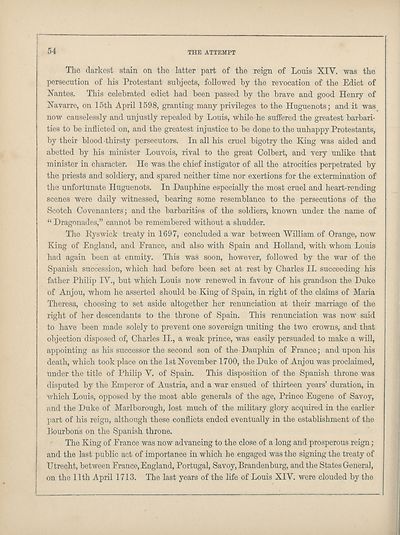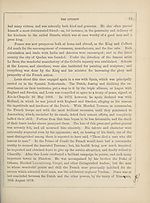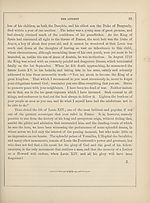Attempt > Volume 1 and Select writings
(66) Page 54
Download files
Complete book:
Individual page:
Thumbnail gallery: Grid view | List view

54
THE ATTEMPT
The darkest stain on the latter part of the reign of Louis XIY. was the
persecution of his Protestant subjects, followed by the revocation of the Edict of
ISTantes. This celebrated edict had been passed by the brave and good Henry of
Xavarre, on 15th April 1598, granting many privileges to the Huguenots; and it was
now causelessly and unjustly repealed by Louis, while he suffered the greatest barbari¬
ties to be inflicted on, and the greatest injustice to be done to the unhappy Protestants,
by their blood-thirsty persecutors. In all his cruel bigotry the King was aided and
abetted by his minister Louvois, rival to the great Colbert, and very unlike that
minister in character. He was the chief instigator of all the atrocities perpetrated by
the priests and soldiery, and spared neither time nor exertions for the extermination of
the unfortunate Huguenots. In Dauphine especially the most cruel and heart-rending
scenes were daily witnessed, bearing some resemblance to the persecutions of the
Scotch Covenanters; and the barbarities of the soldiers, known under the name of
“ Dragonades,” cannot be remembered without a shudder.
The Eyswick treaty in 1697, concluded a war between William of Orange, now
King of England, and France, and also with Spain and Holland, with whom Louis
had again been at enmity. This was soon, however, followed by the war of the
Spanish succession, which had before been set at rest by Charles II. succeeding his
father Philip IV., but which Louis now renewed in favour of his grandson the Duke
of Anjou, whom he asserted should be King of Spain, in right of the claims of Maria
Theresa, choosing to set aside altogether her renunciation at their marriage of the
right of her descendants to the throne of Spain. This renunciation was now said
to have been made solely to prevent one sovereign uniting the two crowns, and that
objection disposed of, Charles II., a weak prince, was easily persuaded to make a will,
appointing as his successor the second son of the Dauphin of France; and upon his
death, which took place on the 1st Hovember 1700, the Duke of Anjou was proclaimed,
under the title of Philip V. of Spain. This disposition of the Spanish throne was
disputed by the Emperor of Austria, and a war ensued of thirteen years’ duration, in
which Louis, opposed by the most able generals of the age, Prince Eugene of Savoy,
and the Duke of Marlborough, lost much of the military glory acquired in the earlier
part of his reign, although these conflicts ended eventually in the establishment of the
Bourbons on the Spanish throne.
The King of France was now advancing to the close of a long and prosperous reign;
and the last public act of importance in which he engaged was the signing the treaty of
Utrecht, between France, England, Portugal, Savoy, Brandenburg, and the States General,
on the 11th April 1713. The last years of the life of Louis XIV. were clouded by the
THE ATTEMPT
The darkest stain on the latter part of the reign of Louis XIY. was the
persecution of his Protestant subjects, followed by the revocation of the Edict of
ISTantes. This celebrated edict had been passed by the brave and good Henry of
Xavarre, on 15th April 1598, granting many privileges to the Huguenots; and it was
now causelessly and unjustly repealed by Louis, while he suffered the greatest barbari¬
ties to be inflicted on, and the greatest injustice to be done to the unhappy Protestants,
by their blood-thirsty persecutors. In all his cruel bigotry the King was aided and
abetted by his minister Louvois, rival to the great Colbert, and very unlike that
minister in character. He was the chief instigator of all the atrocities perpetrated by
the priests and soldiery, and spared neither time nor exertions for the extermination of
the unfortunate Huguenots. In Dauphine especially the most cruel and heart-rending
scenes were daily witnessed, bearing some resemblance to the persecutions of the
Scotch Covenanters; and the barbarities of the soldiers, known under the name of
“ Dragonades,” cannot be remembered without a shudder.
The Eyswick treaty in 1697, concluded a war between William of Orange, now
King of England, and France, and also with Spain and Holland, with whom Louis
had again been at enmity. This was soon, however, followed by the war of the
Spanish succession, which had before been set at rest by Charles II. succeeding his
father Philip IV., but which Louis now renewed in favour of his grandson the Duke
of Anjou, whom he asserted should be King of Spain, in right of the claims of Maria
Theresa, choosing to set aside altogether her renunciation at their marriage of the
right of her descendants to the throne of Spain. This renunciation was now said
to have been made solely to prevent one sovereign uniting the two crowns, and that
objection disposed of, Charles II., a weak prince, was easily persuaded to make a will,
appointing as his successor the second son of the Dauphin of France; and upon his
death, which took place on the 1st Hovember 1700, the Duke of Anjou was proclaimed,
under the title of Philip V. of Spain. This disposition of the Spanish throne was
disputed by the Emperor of Austria, and a war ensued of thirteen years’ duration, in
which Louis, opposed by the most able generals of the age, Prince Eugene of Savoy,
and the Duke of Marlborough, lost much of the military glory acquired in the earlier
part of his reign, although these conflicts ended eventually in the establishment of the
Bourbons on the Spanish throne.
The King of France was now advancing to the close of a long and prosperous reign;
and the last public act of importance in which he engaged was the signing the treaty of
Utrecht, between France, England, Portugal, Savoy, Brandenburg, and the States General,
on the 11th April 1713. The last years of the life of Louis XIV. were clouded by the
Set display mode to: Large image | Transcription
Images and transcriptions on this page, including medium image downloads, may be used under the Creative Commons Attribution 4.0 International Licence unless otherwise stated. ![]()
| Ladies' Edinburgh Debating Society publications > Attempt > Volume 1 and Select writings > (66) Page 54 |
|---|
| Permanent URL | https://digital.nls.uk/109865746 |
|---|
| Attribution and copyright: |
|
|---|

